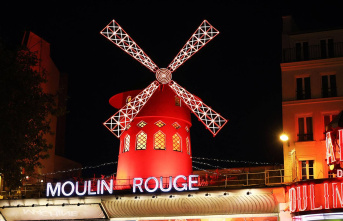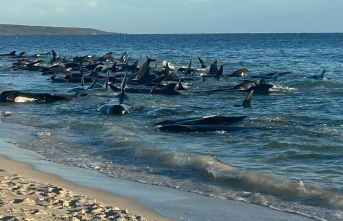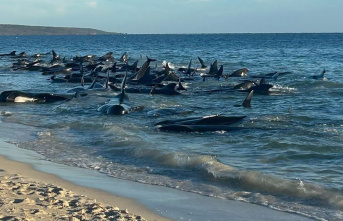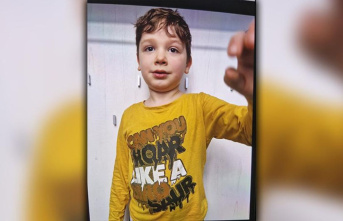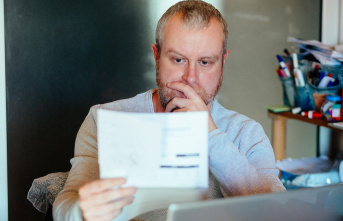Jeremiah has parked his sand-colored SUV at the intersection, waiting for the women to tell him what to do. It's six o'clock in the morning, the streets are still quiet in the blue twilight. Ruth Meriki and her three colleagues have checked blankets wrapped around their shoulders, charcoal glows in the crooked wooden shacks under the eucalyptus trees, there is a smell of smoke and the chestnuts roasting over the roadside fire.
Normally, Jeremiah drives safari tourists through the national parks in northern Tanzania. Today he heaves bulky cardboard boxes onto the roof of his jeep. They are filled with hundreds of sanitary napkins, which he and the small tour group will be transporting from Arusha in the direction of Karatu - and from there on through the roadless, rust-red hinterland, at walking pace, for hours. When everyone is in the car, Ruth says a prayer. Amen. Then it starts.
Ruth Meriki, 36, is a tall woman with a deep, calm voice. "We don't go to these remote areas because it's beautiful there," she says, smoothing down her calf-length skirt. She wore it specially because women in pants could seem strange to the people in the villages. Especially if they also have panties and an anatomical diagram of female genitals. Ruth opens a document from the health authorities on her smartphone: According to a survey, more than 90 percent of all girls in the region have no access to period products. "That's understandable. Where and with what money should you buy some?" says Ruth. "But it's much worse: The girls don't know anything about menstruation. The survey also showed that. Nobody talks to them about it. And certainly not to the boys."
The consequences: girls suffer in silence, their self-confidence begins to collapse as a teenager – and many drop out of school when their periods start. In January 2020, Ruth Meriki and 35-year-old Hawa Kipilili founded the organization EPN. The letters stand for "Elle Peut - Naidim", which translates as "she can". Once in French and once in the Maasai language. "She can, she can," says Ruth, laughing. "That means she really can!"
Their goal is ambitious: they want to help eliminate the 90 percent ignorance. Sometimes people ask her why, given the country's many problems, she's focusing on menstruation, says Ruth. "But if 90 percent of girls don't know what menstruation is and how to deal with it, later on we have 90 percent of women for whom the topic is associated with insecurity or shame. They pass this feeling on to their daughters."
Ruth Meriki studied economics, Hawa Kipilili pedagogy. Together they have developed a teaching program that is difficult to describe with abstract terms such as "menstrual hygiene" or "empowerment". "Of course, there are already such educational courses in Tanzania," says Hawa Kipilili. "But the numbers show that there are obviously not enough." Many of these events, like the school lessons, were mostly head-on and very theoretical.
Hawa is slim and wiry, a woman who shows that everything usually goes too slowly for her. She used to work at the British School in Arusha. She saw that teachers from abroad taught completely differently than she knew, with lots of fun and movement in the classroom. She wanted to do the same for Tanzanian children: "I've decided to work in the poorer parts of our country. There, where they don't even know what a computer looks like. Or a soccer ball, because they just kick canisters."
The most important remedy against shame is humour: "We explain the topic in extremely simple terms and using situations that the girls and boys are familiar with," explains Hawa. "Where they live, there is no running water, no mirrors and no supermarkets. It should be accessible and fun. If you listen to us, you can easily tell the content later."
The courses always end with a gift and a small ceremony: each boy gives a classmate a pink pack of "Salama Pads" that the EPN team brings with them to their assignments. The washable pads are made in Tanzania, can be reused and cost around one US dollar each. Ruth and Hawa don't think much of tampons and other western hygiene items: "Too expensive and too much plastic waste."
In addition to the founders, the mobile reconnaissance troop also includes Ruth's sister Flora and Hafsa Mussa, who are responsible for evaluating the project. Sitting next to the driver is Herison Phanuel. A gentle, reserved teacher, he and Ruth live not far from each other in Arusha. He does the program for the boys and occasionally for the men who come over. In order for everyone to dare to take part, it would be better if the sexes were taught separately. "Boys know next to nothing about menstruation," says Herison. "They are never included and do not appear in the instructional videos either." They are brothers or later fathers. "If they understand what's going on, part of the problem is already solved."
In the town hall of Karatu, however, the lady first has to be picked up by the office. Since it is about school children, the authority wants to keep an eye on the matter. She would like to know from the stern reporters how the topic is handled in Europe. Every schoolgirl there is certainly given a small suitcase with products every month. Unfortunately, we have to straighten out her positive image. In Europe, too, the phenomenon of period poverty – i.e. not having enough money for corresponding products – and the stigmatization, especially among younger women, are a tacit but widespread problem. "Oh," says the woman from the authorities. "Ts," says Ruth.
Hawa studied in Great Britain and lived in Spain for a number of years. She knows the stories of women who mumble about headaches and disappear from the seminar room. In poorer countries, however, the consequences are far worse: “The beginning of the period is like a brake on the lives of many girls. They are told that they should rather stay at home. They miss classes and are involved in housework. But a lack of education means poverty in adulthood. That's why it's not a woman's problem, but one of society as a whole."
According to the World Bank, more than 120,000 Tanzanian girls leave school every year – a place that protects them from sexual assault.
Teenage pregnancy rates skyrocketed in Tanzania during the first lockdown. "Luckily, President Samia Suluhu Hassan finally changed the rules!" says Ruth. Pregnant women and young mothers now have the opportunity to continue to attend school classes - previously it was forbidden by law. Samia Suluhu Hassan has been the country's president since March 2021. The first woman in office.
Outside, the landscape rolls by, reddish brown and green. Just when you think you've finally landed in an area where there is not a living soul but a few boys on motocross machines, Jeremiah parks the car next to a rectangular, ocher-colored school building with a tin roof. Behind it are umbrella acacia trees, in their shade about 100 girls sit politely on wooden chairs. Everyone wears school uniform: dark green sweater, yellow T-shirt, dark green pleated skirt. No one says anything, only a few chuckle softly.
In the staff room, the headmistress tells us that there were many more girls waiting in the classrooms. Also some mothers. And of course the boys. One begins to understand why Ruth Meriki and Hawa Kipilili call their program "influential". On their tours into the hinterland, they teach about 400 children per school. Depending on the distance and possibilities, they visit one to three places a day. The goal is to create a network and involve local health authorities, teachers or shop stewards from the villages in such a way that they can disseminate the program content themselves in the long term and evaluate learning goals. "If we get 500 students, we're actually going to get 1,000," says Ruth. "Because they share knowledge with their cousins and sisters."
The lady from office is placed at a wooden table under the tree, Herison goes to play soccer with the boys. A team-building measure - later he will tell them that they have responsibility for their classmates, like a captain for his team.
In the shade of the acacia, the girls tell each other the menstrual fairy tales they grew up with: you're not allowed to cook or salt your food during your period. You get pregnant when you're in the same room with boys. Painkillers make you infertile. If you move too much, your internal organs fall out. The smell attracts dangerous animals. Or makes the milk of the grazing animals go sour. One of the mothers says that for a long time she didn't even know that all women get their periods. She thought something was wrong with her and that she was going to die soon: "If I say it like that now, I have to laugh myself."
It gets very quiet under the tree as Ruth and Hawa unpack the products: tampons, pads, menstrual cups, panty liners with and without adhesive strips. They show everything the industry has to offer - and explain to the girls that they don't need any of it. Poverty does not necessarily lead to inflammation and infection. Clay plugs, feathers or dirty rags, on the other hand, do. The students learn how to fold the simple cotton fabric that everyone has at home, wash it in cold water and then flatten it with a hot carbon iron to kill bacteria. "This," says Ruth, waving a cloth bandage in the air, "is used by women all over the world. There's no reason to be ashamed of having nothing else." Some mothers blink back tears.
Then the reusable pads are explained, which you only have to rinse out and dry on the clothesline in the sun. From their interviews, Ruth and Hawa now know that this is the most popular solution among the girls.
The taboo has nothing to do with religion or traditional barriers, says Hawa. "The parents just don't know what to say." It's just not common to talk about your own feelings. This is also where the speechlessness comes from. "Self-reflection, sensitivity to one's own psychological well-being - that hardly occurs in families, and that's why there are almost no words for it." That's why she came back to Tanzania after her studies. "There is so much to do."
Back in Arusha, in the small lilac-walled room Ruth rented three years ago: EPN's headquarters. Outside, roosters are crowing, Hawa is sitting at the computer, which her brother has loaned her, and is typing the program of the past few days into Excel spreadsheets – for the reports that she will later send to the authorities.
Ruth and Hawa work on a voluntary basis, their organization lives on donations that they collect from parishes, companies or institutions such as the Rotary Club. "I walk around asking for money," says Ruth, "all because of the period, one of the most normal things in the world." She decided to use her strength and knowledge because it was a problem that was actually relatively easy to solve. "You just have to set the course differently and invest a few dollars. Strong girls become strong women - that's exactly what we need for our society to progress. It's no small thing!"
Ruth Meriki grew up with five siblings in a Maasai settlement near Arusha. Her parents wanted their daughters to go to secondary school too. "My mother was always a hands-on, self-confident woman. She worked as a teacher and sold milk on the side. Very progressive actually. But she didn't talk to me about her period either."
Ruth says one of the reasons she started EPN was because she experienced it all herself, the sandy cotton shreds and the illnesses. She only found out later at the high school in Dar es Salaam that there is another way. "The girls in town were very frank! They said, 'Look, these are underpants and they belong in there.'" Every time she drove home from the capital, she would bring a pair of pads for the others girl with. Later she worked for a safari operator and distributed the bandages on tours in the remote backcountry. "My friends said to me, 'Ruth, you're possessed!' Then God gave me two daughters too. That was like a sign. I don't want to see what girls go through anymore. I want that to change."
Hawa Kipilili says that the period bans hit her hard on the soul. "Today I would say: I became depressed. I didn't know that at the time." She was a wild girl, all childhood she had romped around with her twin brother. Then she told her mother about the blood. She thought she hurt herself. "My mother just looked at me and said, 'From now on you'll never play with your brother again. You can't be around men. Otherwise you'll have a child.'"
Hawa was 14 and didn't know how to do it. Boys were everywhere, including at home. "I withdrew into my own world. I wasn't wild anymore, I didn't run races anymore, and when my brothers teased me, I didn't fight back. I was scared all the time." When her parents divorced, Hawa and her four siblings were left to fend for themselves. Her father was exhausted from the argument, her mother never there. "I knew that if I wanted to earn money, I had to go to university. And I did that. In Tanzania, it's often the women who feed the family. Many men leave, some drink. That's why it's the way it is important to make the girls strong early on."
Since the program began, EPN women have taught 16,500 girls and 6,200 boys. Two male teachers have just joined. "More teachers means more children can participate," says Ruth. By the end of 2024, they want to have reached 45,000 students with their program. That is the goal. "She can, she can," says Ruth Meriki. It sounds like a magic spell.


